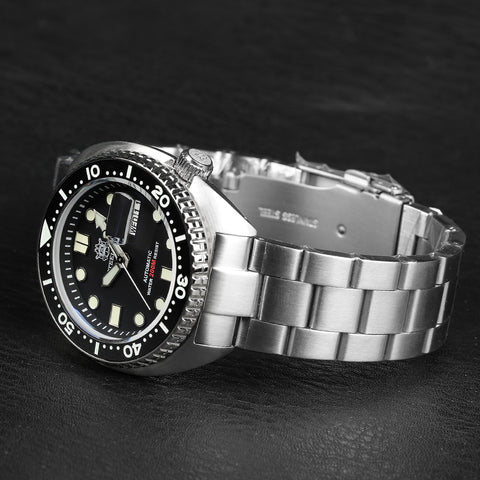So you've decided to purchase your first mechanical watch. But, hold on a second. A mechanical timepiece may be regarded as the ultimate male accessory by some, but have you given it careful consideration? Here are ten things to consider before selecting a ticker.
Accuracy
A mechanical watch, while accurate for most practical, day-to-day needs, will never be as accurate as a quartz battery-powered watch, let alone a smartwatch synced to a smartphone. Indeed, most manufacturers claim a daily loss or gain of about 10 seconds.
If you need to know the exact time, a mechanical watch may not be the best option. After all, the technology has been obsolete for over a half-century.
-Tactical frog watches sub 300TV3
Functionality
Even bigwigs in the watch industry will tell you that the appeal of a mechanical watch these days isn't really about what it does – because you almost certainly have something in your pocket that can do so much more, so much better. Mechanical watches, on the other hand, have so-called "complications" – functions that go beyond simply telling the time.
The chronograph is the most common type of complication – useful if you have a lot of eggs to boil. Even better would be a GMT/second time zone – you know, for when people actually traveled. Waterproofing has obvious advantages for some people.
This all adds to the cost, but perhaps there's a complication that can actually help you rather than just look cool.
Servicing
There are some excellent mechanical watches available for less than $500. However, many of them are priced in the thousands or tens of thousands of dollars. However, once you've paid that, your expenses don't stop there. A watch, like all mechanical devices, necessitates maintenance.
Manufacturers recommend a full service – disassembly, oiling, reassembly, and so on – every three to five years or so for a watch that is worn frequently, something that is required to keep it working well and holding its value. And that's only five years for, say, a diving watch that gets dunked on a regular basis.
What's the catch? A service could cost anywhere between £250 and £1000 – money that could, of course, be spent on a new watch. The more complicated your watch, the more expensive a service will be.
Materials
-Heimdllr watches titanium MM300
The actual mechanics of a watch movement improve by microns – the fundamentals remain largely unchanged for over a century. Where the watch industry has truly advanced in recent decades is in its embrace of advanced materials; sometimes in movements, but more often in cases, bracelets, and bezels.
Titanium, ceramic, and proprietary blends provide advantages such as lightness, strength, and scratch resistance. They aren't cheap, but they may be worth it to reduce wear and tear, especially if you're a heavy-handed user.
Movement
Okay, so some people are fascinated by the micro-mechanics of a watch. They will pay close attention to the type of movement in their intended timepiece.
Is it manual (which requires daily winding) or automatic (which will continue to run as long as you wear the watch)? What is the power reserve of the watch if you take it off (i.e. how long the watch will keep running just sitting on your bedside table)? And, for true watch connoisseurs, is the movement made in-house, by the manufacturer (considered, though not always correctly, a quality benchmark), or bought in (from a company like ETA) for use by the watch brand?
-Steeldive watch SD1934 smooth DJ homage
Style
Okay, so some people are fascinated by the micro-mechanics of a watch. They will pay close attention to the type of movement in their intended timepiece.
Is it manual (which requires daily winding) or automatic (which will continue to run as long as you wear the watch)? What is the power reserve of the watch if you take it off (i.e. how long the watch will keep running just sitting on your bedside table)? And, for true watch connoisseurs, is the movement made in-house, by the manufacturer (considered, though not always correctly, a quality benchmark), or bought in (from a company like ETA) for use by the watch brand?
Investment
Okay, so some people are fascinated by the micro-mechanics of a watch. They will pay close attention to the type of movement in their intended timepiece.
Is it manual (which requires daily winding) or automatic (which will continue to run as long as you wear the watch)? What is the power reserve of the watch if you take it off (i.e. how long the watch will keep running just sitting on your bedside table)? And, for true watch connoisseurs, is the movement made in-house, by the manufacturer (considered, though not always correctly, a quality benchmark), or bought in (from a company like ETA) for use by the watch brand?











